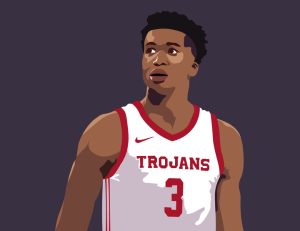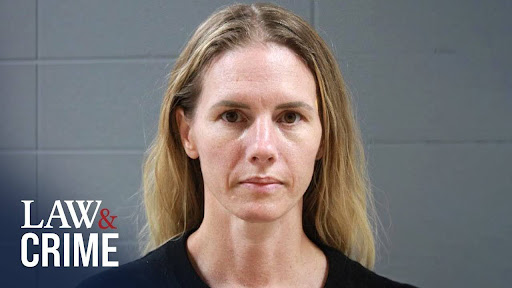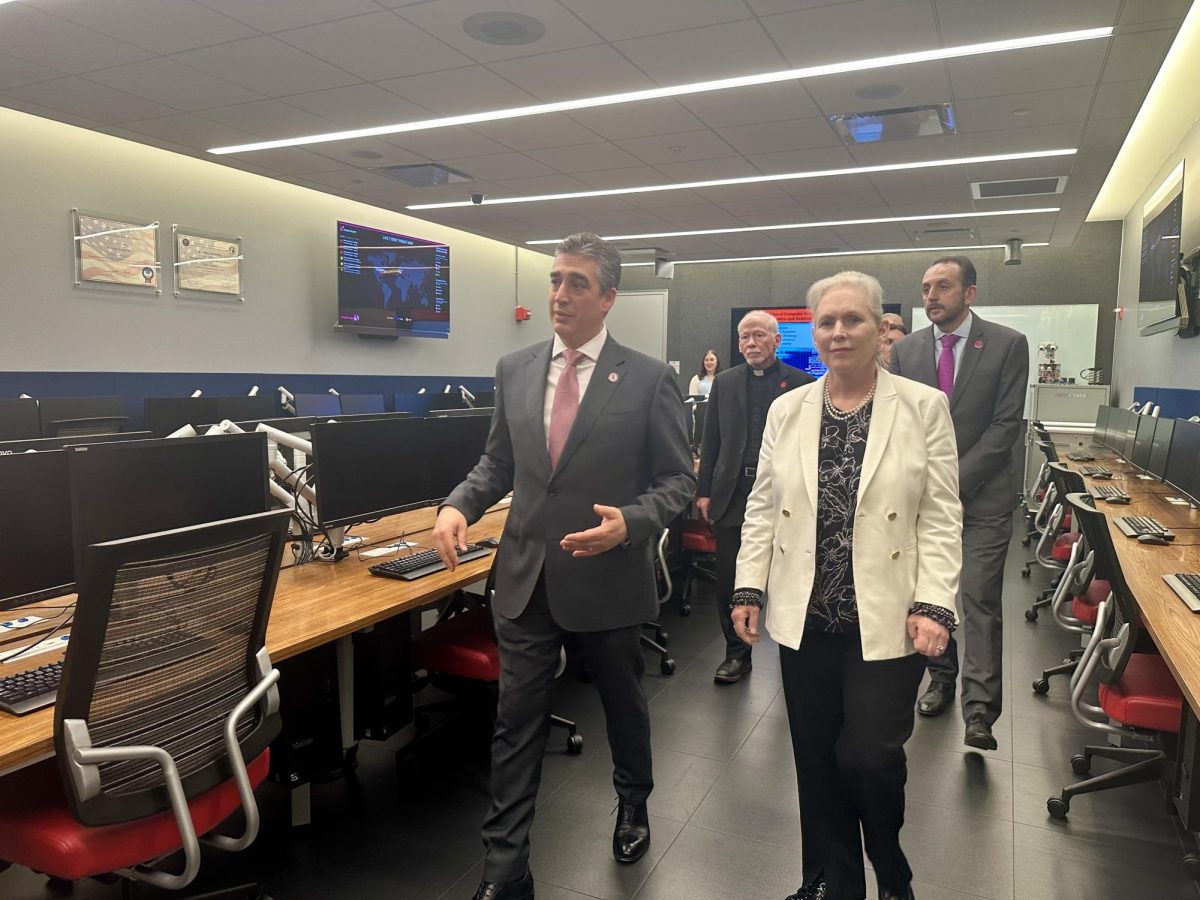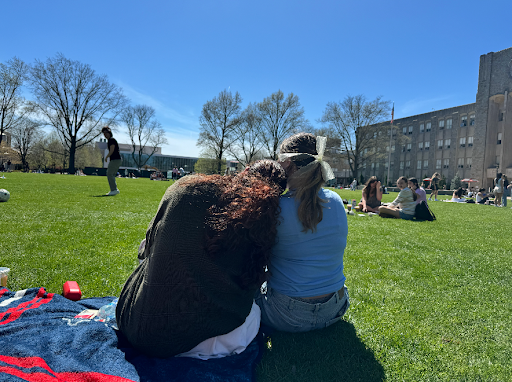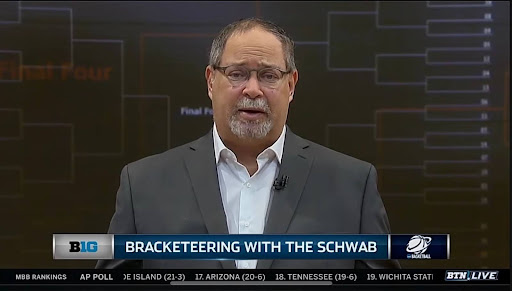As he concludes his 20th year as president of St. John’s University, Rev. Donald Harrington sits down with the Torch to discuss his proudest accomplishments, improving student engagement, residence life, and coach Norm Roberts.
Torch: Services like the Princeton Review and U.S News and World Report consistently rank St. John’s as a third-tier school. Is improving academics one of your chief concerns in the coming years and, if so, how do you plan on doing this?
Harrington: First of all, the rankings are not really rankings of just academic quality. They include donations by alumni, graduation retention rates, even things like class size. So it’s not like they’re doing a ranking saying these are the best schools. We have gotten as close to the top 125. We were 126 a few years back, and then we slipped back. And the issue we slipped back on is an issue highlighted in the Torch recently, namely retention and graduation rates. If our retention rates stayed where they were, we would be well into the top 125. So in a sense, it shows that it’s not a ranking of academic quality. During the whole transition from a commuter to a resident school, we slipped in student engagement. This year I’ve engaged myself in what I call an institutional dialogue on student engagement to address this as best we can. Now, from January to January our retention improved one and a half percent, which we’re pleased with, but not satisfied with. So, we’re trying to really come to understand what is the real retention issue because then that, in and of itself, will make a difference in the rankings.
But, having said that, we’ve grown stronger and stronger. Our SAT points have increased by 100 points in the last five years and in terms of statistics, and talking with faculty, it’s clear we have one of the strongest student bodies we’ve had, maybe ever. So I believe we’ve made great progress in academics – and don’t forget that other piece of academics, which is the use of technology in the classroom, and we continue to be ranked in the top 10 in that, in terms of wireless environments. So there are a number of things you can point to and say, “Hmm, pretty significant.”
From what you’ve found, what do you think could account for the University slipping in terms of its student engagement?
I would rather not speculate on any one thing. From what I can see, I think there are a number of different factors that could be at play. One of those factors is the question of whether or not we adequately address the great variety of interests and needs of our students.
Some of those who leave are those who, as we’ve gotten bigger and we have more students coming from a distance, maybe feel lonely, feel not as engaged, not as involved.
Another factor is, I think resident students need to be engaged in a different way from commuters. And I think, for years, many faculty and administrators were used to students being here from eight in the morning until about one in the afternoon, and then again at six at night, and maybe they weren’t used to the 24 hour needs of students.
And the third factor I would put out there is the millennial student is different. I’m just not so sure if we have watched that change, studied that change, carefully enough.
Some students say we’re their second choice, and they’d rather be at NYU. So when they get the opportunity to transfer, they do it. It’s just a lot of different factors, and I think the biggest mistake would be to say, “Here’s the one thing.” We’re trying to reshape the community so we can hear what students think and they can always hear us, then we’ll always have an engaged community.
Residence life is something that sprouted up during your tenure, something that you pioneered, and something that’s aided the school’s national recognition. There have been criticisms, though, that there is not enough to do in the Residence Village or that the campus is dead on weekends. Is Residence Life currently where you wanted it to be when you started it ten years ago, and what plans do you have for its future?
I’d say a couple of things. Is it where I would want it to be? No. And I say that because clearly, I hear students saying the things you just said. One of the things that have impacted the resident experience, from what I hear, is the concern of the visitation policies. Fr. Maher [Vice President of Student Affairs] has been working very hard to address that. For safety concerns, we don’t want to go just totally open, so we’re trying to keep a fine balance. But I hope students see we are trying to keep that balance, that we are making changes to address the issues they have been talking about. So in the nitty gritty things, we still have a lot to learn, and also our students continue to change.
Secondly, if we were satisfied with student life in general, but in particular residence life, we wouldn’t be building the new student center. I mean, that’s a $75 million building. We want to really enhance the academics with the academic piece, but we also want to create a place for commuter and resident students to come together. And I would presume that many of the resident students would use it more than commuter students. That’s a major response on our part to what a residence campus requires. We desperately needed a University Center, and it takes a long time to get there, but we’re going to be there come August. And that, in itself, is sort of a very loud, shouting answer to the question.
But there are students who come here and absolutely love it. I try to be at the 5:30 mass every night, if I’m in town, to celebrate or concelebrate it. And to see that church full, and to see the enthusiasm of the students afterwards, really says to me it’s working here, and there’s a great community.
I was president 10 years before we opened up the first residence hall. And I was resistant because I thought our mission was to New York City kids, but I think we’ve done it in such a way that we haven’t walked away from that.
Is there any hope to expand the residences, to have more out-of-state students in coming years, or do you like the balance as it is now?
I learned, after having said for five years, “We won’t have any residences in my time,” to not say absolutes. But having said that, I think it’s a good balance right now. Are there other places we could expand? I think so. We have the Henley Road dorm going up for upperclassmen, so there are some other possibilities. Our applications are off the charts for September, over 51,000 now for the freshman class. And a huge percentage is what we call the secondary market, outside the area.
Right now, my fear is the commuter students getting lost. In my meetings with Student Government, in the beginning they were all commuter students. And now they are almost all, if not entirely, resident students. So I want to watch that to make sure the commuter students still feel heard.
Let’s briefly talk about economics – something you’re quite familiar with. After all, you were the first priest to be on the board of directors of a Wall Street firm, with Bear Stearns.
And I was on it for 15 years, yeah.
And you were on it last year during its crisis?
Yes, right up until the end.
So you’ve had experience with the current recession. And in regards to the University’s economics, there’s a fear about the state of private institutions. With state schools costing far less, the concern is that there could be a significant drop in interest in private schools in the coming years. What do you see for private institutions in the coming years, and are you taking any actions to help counteract any of that for St. John’s?
I believe that the fear or concern is a very valid one, because I can see students saying, “If I can go to a state university for $3,000, and spend thousands and thousands to go to a private universit
y, is it really worth the difference?” And that’s always been a very valid question, even more so now as dollars get tighter.
In the current year, fall semester, we drew back money from any departments that could afford it to establish an extra pool of money for extra financial aid for students who needed money in January. And there were students who needed the money in January because their parents were losing jobs, etc., and so we were able to help them to continue. We have not put a hiring freeze in place, but we have an extra level of review for any positions. In terms of faculty, we normally hire 30 to 40 a year.
This year, there may be eight or 10 new faculty. And the reason is we want to make sure there are resources for our students, and secondly, I would rather not hire someone than have to lay someone off because money is tight.
After having said that, I’m optimistic about St John’s. As I said, applications are very, very strong, deposits are very strong, even deposits for room reservations are strong. So it looks as though, unless the bottom falls out, we should be fine. But fine doesn’t mean we’ll be wealthy. Nobody is wealthy in this environment.
One of the criticisms of you is that you’re not on campus enough, that you’re not, for lack of a better term, “in the trenches” with faculty and administrators on a daily basis. How do you respond to such criticism and, on that same token, what do you feel are your primary functions as president of St. John’s University?
First of all, I am here a lot, but I’m not out walking around campus looking for people to talk to or whatever, and it’s because I schedule myself pretty tightly, so my time is used well when I am here. So every day, I sit down with Dr. Pellow, or Dr. Upton for the academic side of things, or my own Chief of Staff, Rob Wile, for an overall briefing of what’s happening on all the campuses, international and all that.
I’m probably home one night a week. This weekend, for example: tomorrow morning I am celebrating a funeral mass for the brother of one of our trustees emeritus. Then I have to be in Jersey by 11:45 to do the baptism for the grandson of one of our trustees. Sunday afternoon I fly to Rome.
I’ll be back Thursday afternoon from Rome after three days of different types of meetings there. That gives you somewhat of a sense of what it’s like. I don’t try to do other peoples’ jobs.
I don’t get into the nitty gritty. I feel my job is to keep the overall handle on what’s happening, to be the face of the institution, and to be the fundraiser.
Right now I’m working hard to get a name on the UC/AC when we dedicate it, and that would be a multi-million-dollar commitment of some sort to the University. So those are the things I focus on.
What I would like to do all the time is not be president and spend time with the students. That’s what I love. You know, my prior life was at Niagara University, and I was there for 16 years. I went there newly ordained, taught, lived in a freshman dormitory, and I loved those years. They asked me to be president up there, and I said, “I don’t really want to do that.” Finally, I agreed.
Each president of every institution has no one way of doing it. You have to find your own way, find the way you think you can best use your own skills and gifts to make this stronger, and that’s what I try to do with my time.
You’re finishing your 20th year with the University. What’s been the one thing you’ve been most proud to accomplish in your time here?
I’m not going to keep it to one thing. The thing I’m most proud of at St. John’s honestly, is the students. I think our students have just gotten stronger academically. They’ve gotten stronger in their commitment to service, they’ve been instrumental to the mission of the University. I’m just very proud of the students.
I’m very proud of our transition to becoming a residence university, because that is making us a much stronger national university. And when you go forth with your diploma, it will be much more recognized in California, Rome, or Paris than it would have been 20 years ago.
I’m proud of what we did with the facilities – that took a lot of fundraising. But if you look at the residence village, my favorite thing is the church.
I came in with a dream to build a church, and we got a single $10 million gift to make that happen, so I’m extremely proud of that.
What has been your biggest regret, or something you wish could have been done better in the last 20 years?
The downside, the one thing that’s been a real disappointment, is obviously the basketball tradition, which has been so important to us.
The bottom line is, we made, early on, some bad decisions regarding the men’s basketball team, and that’s been a disappointment to a lot of people. Me too, since I’ve always been a huge basketball fan.
Are there external factors in it? Yeah. The recruiting has changed so much because of television, conference structure, etc. So a lot of excuses can be made, but I don’t make any excuses.
Bottom line: I don’t think we made good decisions regarding the men’s basketball team. But, once we hit the bottom with the Pittsburgh incident and the NCAA violations that came out after that, I was determined not to have this institution be embarrassed again by that type of behavior on part of the students or anything that could be slightly questionable to the NCAA. And that became my top priority with that program. And yes, we would continue men’s basketball, but it had to be done the right way.
And that’s what I so appreciate Norm Roberts for. He’s done it the right way. These young men are representative students of St. John’s, and academically, they are very strong, much stronger than in the past. Character wise, we hear from people in different cities who meet them in hotels and such, how representative they are.
There’s not a bit of NCAA questioning as far as I know of, and there better not be.
And the last piece is we are making progress each year, and I believe Norm is going to be able to bring us back to where we were.
Do you feel students, fans, alumni and the media have been unfairly lambasting Norm?
Again, turn to the positive side of this: people still really care about St. John’s basketball.
And there are people who have different levels of patience, and different levels of understanding how bad the situation was that Norm inherited. Fair, unfair, I understand why people really want us to win on a regular basis at the top immediately. I don t think anybody’s more in that category than Norm Roberts.
But I’ve also seen what has to get done to get where we are now, and I think we’ve made great progress, and I have great confidence that Norm is going to be able to bring us back there. He’s a fine man and a fine coach.




